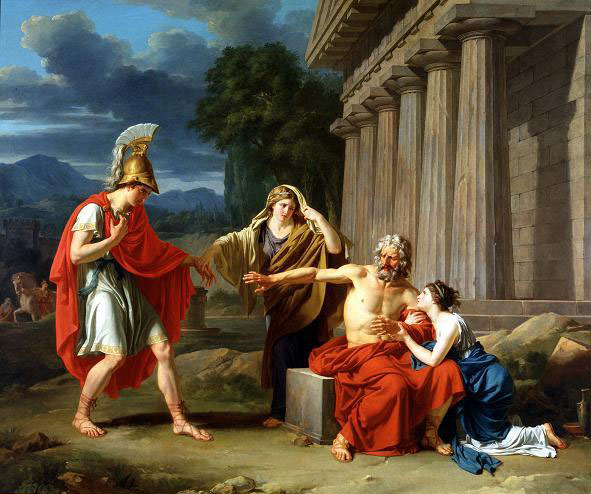“Try to exclude the possibility of suffering,” wrote C.S. Lewis in The Problem of Pain, “and you find that you have excluded life itself.” Man has always suffered, and we have always tried to cope. The urge to understand suffering is what’s behind one of humanity’s richest literary traditions: tragedy.
Whenever we see the term in the news, we know it to be an account of terrible suffering. The Greek tragedies wrestle with the depravity of man and his capacity for wickedness. The ancient Athenians, well before the advent of Christ, felt the weight of the Fall and the need for redemption. In his literary criticism Poetics, Aristotle defines the genre of tragedy. He explains that the fear and pity evoked in the audience allows for catharsis, or purification. Catharsis isn’t just the purging of ourselves of something, but it has the end in mind of purging ourselves of sin. As this process is displayed on stage, we understand truths about suffering, misery, and redemption.
But how do the Greek tragedies, stories filled with parricide, adultery, and incest, aid our ninth grade students in their aim to know and love Christ more? While many plot points in these stories are jarring, like many stories in the Old Testament, they shouldn’t be avoided. As students are faced daily with an onslaught of immorality from American culture, our job is to carefully guide them as we survey the effects of sin. When we study stories of sin in an ancient context removed from our own experiences, truth, goodness, and beauty shine apparent. Because the authors were created in the imago Dei, the inherent value of man and the themes of the gospel are echoed in every work. The biblical reading of life is true, therefore the themes of literature are strongly drawn toward it.
Sophocles’ Oedipus Rex is a tragedy with instant name recognition. It is about a hero who, unbeknownst to him, murders his father and marries his mother. Like all good tragic heroes, Oedipus does not deserve the fate given to him. Many of my students find this the most arresting part of the story. Because the pagan gods appear haphazard and cruel, the story prompts us to long for the one true God who rules our world with love and grace.
Before he was born, Oedipus’ fate was prophesied. To avoid it, his biological parents exposed him on a hillside to die. In my classroom, this common practice prompted a heart-wrenching discussion about how similar our culture’s modern view of value of infants is to that of the pagans.
In the play, a young Oedipus discovers the prophecy from the oracle of Apollo and attempts to flee from this fate. After killing the king of Thebes, his biological father, at a crossroads, he uses his cunning wit to rescue the city of Thebes from the riddling Sphinx. The Thebans then make their rescuer their king–their own king having disappeared–by marrying Oedipus to the queen, his biological mother, Jocasta. Years into his tenure as king, a plague befalls the city. He vows to discover the root of the plague, ironically unaware that his sin caused the plague in the first place. The blind prophet Tiresias begs Oedipus to forsake his search, but he persists in his search for truth, unaware it will unravel the life he build.
While Oedipus is a product of a cruel fate, the terrible decision he made at the crossroads to murder his father, a stranger to him at the time, took him down the path that led to his destruction. We all stand at a perpetual crossroads; each of our choices takes us down one path and, necessarily, closes off the one we did not take. Sometimes, as was the case with Oedipus, three roads come together, and our choices are made all the more complicated. But we must choose and make our way down the path we have selected. That that path may also be the one we were fated to take does not undo the reality of the choice.
Oedipus’ tale begs our students to seriously confront their own daily choices. Like Aristotle suggests in his definition of tragedy, we pity the misery of Oedipus while fearing that we ourselves could make a life-altering mistake ourselves. Oedipus “atones” for his sin in his cathartic act of blinding himself. His physical blindness reflects the state of denial he lived in before exploring the roots of the plague. As Oedipus seeks to cleanse Thebes of the plague, he himself is, in the story, “cleansed” of his sin, but only by his own terrible suffering.
Every man is guilty of walking down sinful paths. But because of the grace of God, Jesus bore our punishment on the cross. If Christ had not paid our debts, Oedipus’ story would be our own. We cannot escape the guilt into which we were born. There is no hope for Oedipus, because in his universe there is no one to give mercy, no one to expiate his guilt; there are only the relentless laws of nature. Oedipus’ story prompts us to remember the sacrifice Christ made. His sacrifice has transformed the story of our world from tragedy into comedy. Because of Him, we live not in a tale of futility and sorrow, but in a drama of redemption and hope.


